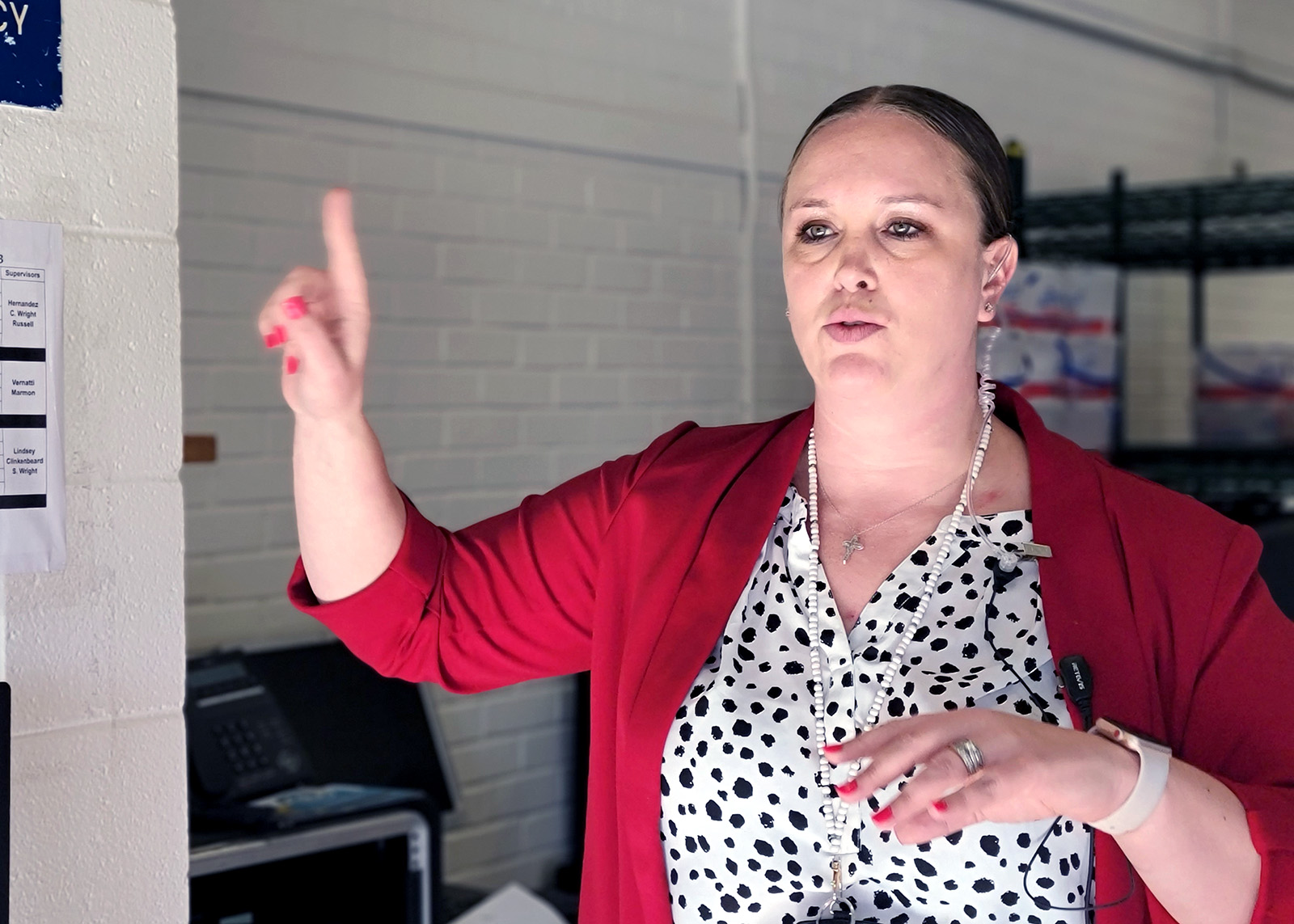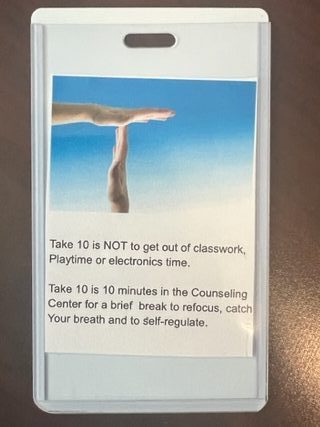If a student is feeling upset, anxious or on the verge of an outburst at Reed Academy, the middle schooler has a preventative space to address emotions before they get them in trouble.
It’s called the calming center, and it’s near the school counselor’s office by design. Students can flash a “Take 10” card to a Reed teacher or staff member that lets them know the student needs time to re-center.
Students in the calming center can clean algae off its salt-water fish tank, color in adult coloring books or burn energy with fidget toys, said Sarah Strohm, principal at Reed. They can’t use their phones. For students with anxiety or stressors, she said, the calming center provides a place to process developing issues in 10 or 15 minutes rather than in an outburst that can become a barrier to learning for the student and the rest of their class.
Similar spaces can be found in a number of Springfield Public Schools now, and next year they will be added to all K-8, middle and elementary schools across the district. It’s an initiative that is part of a plan SPS leaders presented to the Springfield Board of Education on May 2 to address discipline issues this coming school year and beyond.
From teachers, parents, students and board members, SPS leaders have heard concerns about the growing number of, and severity of, student behavior issues. At the April 25 board meeting, a contract to train teachers on conscious discipline techniques was singled out. Springfield Board of Education members wanted to hear an overall discipline plan before approving parts of it in piecemeal fashion. The board got an initial look at the larger discipline plan during Tuesday’s board retreat at York Elementary School.
Superintendent Grenita Lathan presented a 15-point plan to address student behavior issues. The presentation was part of a larger update on how school leaders are addressing pieces of the SPS strategic plan.
“Some are new, and some are refinements,” Lathan said when asked by board member Kelly Byrne if all 15 steps of the plan were new. “We just need to tighten up some things that we’re doing.”
In-school, out-of-school suspension days number in thousands
The most recent SPS annual report, for the 2021-2022 school year, shows students at all of Springfield's public schools received a total of 7,278 in-school suspension days and 3,573 out-of-school suspension days. Those are higher totals than the previous two school years, but in-person learning was disrupted by public health concerns during both years. There isn’t data for a similar period before the COVID-19 pandemic, because the discipline policy has changed.
First steps will be taken soon
The first step in the planning process will happen later this month. Lathan said all staff will take part in a one-hour professional learning session on discipline expectations and plans for the upcoming school year.
“That is a mandatory meeting,” she said. “No exceptions.”
Between May and the start of the next school year, all teachers and administrators will receive training in positive behavioral interventions and supports, or PBIS, in step with their previous experience with the concept. Some Springfield schools have used the framework, which is designed to provide support for students’ social, learning, behavioral and emotional needs, for several years. For others, it will be new. For everyone, it will also be mandatory, Lathan said. Substitute teachers will also be required to undergo mandatory training on behavior and classroom management.
‘Focus rooms' to be added at all middle, elementary school campuses

Across all district campuses — and in virtual learning environments, as well — Lathan said there will be an effort to form a common language when it comes to dealing with discipline issues. With that, there will also be system-wide protocols for spaces dedicated to helping students navigate their emotions.
Middle schools and high schools across SPS already have in-school suspension rooms for students who have violated the district’s code of conduct. And some middle schools have developed what Lathan called “focus rooms” — spaces where students can collect themselves, work through behavior issues with a staff member and ideally rejoin the classroom setting and not cause disruptions.
Lathan said that model will be put in place at all SPS middle and elementary schools. In middle school and K-8 buildings, the focus room will be staffed by a behavior interventionist. At elementary schools, paraprofessionals will staff the focus rooms.
Strohm, the principal at Reed Academy, said the staff tracks which students are utilizing the school's version of a focus room through a check-in, check-out process. She said students who had received several office referrals prior to using it have, on the whole, decreased their frequency of negative visits to the office.
“That's the end goal, right?” Strohm said. “So it's there, and we have to make sure to teach kids how to use it. So we have a system in place for that as well.”
Strohm said the system is a two-pronged one. First, teachers were trained that the room is there to help them as well as students. If a teacher can pick up on a student's escalating misbehavior before their fuse is blown, Strohm said, they can suggest the student take a break in the calming center.
“And so helping them by saying, ‘Hey, take a break, you're not in trouble,'” Strohm said. “And that's what's so important for kids to understand. You're not in trouble. ‘I want you to take a break, and I can't wait to have you back in my class here in just a few minutes.'”

The second step, she said, was recognizing that a 12-, 13- or 14-year-old student is unlikely to want to raise their hand in class and explain that they need a break from the environment. That's where the Take 10 card comes in. The cards, made from luggage tags, are used as quick indicators for students to communicate to teachers they need space.
“All they have to do is stand up and show that to their teacher, and then they go,” Strohm said. “They go, they check in, they set their timer and then they return.”
Lathan said it’s a better model than putting students who perhaps just experienced a bad situation at home or a personality conflict on campus in the same room as students whose behavior crossed a line that led to a day or more of in-school suspension (ISS).
Board member Shurita Thomas-Tate, who is an associate professor in Missouri State University’s Department of Communication Sciences and Disorders, said students with individualized education plans or 504 plans could benefit from having a focus room option as opposed to ISS or out-of-school suspension.
In the coming months, Lathan said, the district’s senior leadership team will work to develop a set of key performance indicators that will be used to quantitatively monitor and measure where the district has succeeded in improving discipline issues and where growth needs to happen. Lathan said the board would get an update later on as that system develops.
Throughout the school year, Lathan said, school administrators and others will review what she referred to as the “big five” elements of discipline data: location of an incident, time, day of the week, who was involved and what type of incident. With that information, she said, site and district leaders will determine if a school is in need of a site intervention to better address discipline issues. SPS executive directors of learning will also review building discipline reports on a quarterly basis.
Administrators will also conduct school behavior and safety audits of all schools in an effort to collect building- and classroom-level data on routines, procedures, climate and culture and more variables that could affect how discipline is addressed at a school site. The data will be used to develop more targeted professional learning, Lathan said.
“So as we go out to the campuses and conduct these audits, we’re going to say, ‘Okay, this particular campus … the transition is not going well.’ Or, ‘We’re still seeing all these types of incidents occur during lunchtime.’ What type of training do we need to provide to address that?”

Lathan emphasized that these steps and others she discussed were part of an initial effort to address the issue and that some steps will undergo additional development and more steps could be taken. The final step in the plan presented at the retreat is for SPS administrators to explore more alternative placement options for elementary and middle school students with behavioral-related educational disabilities. Nicole Holt, SPS deputy superintendent of academics, said that the goal of such programming would not be for a student to follow an alternative track “from the time they’re in fourth grade all the way ‘til they graduate.”
The idea behind this, Lathan said, “is some students need to come and go.”
She added: “They just need a time for adjustment, but still focus on academics and then go back to their home setting.”
Lathan said the board will begin to see updates on how the plans are being put in place this summer. Byrne said he appreciated the district leaders’ work on the topic and said he supported heading full-steam ahead in that direction.
Change will take time, former principal says
Judy Brunner, Springfield's newest school board member, cautioned fellow members not to expect an instant turnaround when it came to addressing students with behavior issues. Brunner, a former SPS principal who now works as a consultant with school districts on bullying, safety and other issues, compared it to dieting.
“Think how hard it is to change your behavior,” Brunner said. “You can lose weight, and then you put it back on and then you lose it again. Because habits don’t change.
“I caution all of us — and I’m reminding myself in saying it out loud — these are children and their behaviors oftentimes have become habits, many of them poor habits. And their response to authority is oftentimes not acceptable in polite company. But it’s going to take a while to change habits.”

